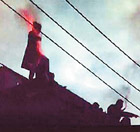Society
Burning issue
By Huang Zhiling and Liu Weitao (China Daily)
Updated: 2009-12-08 09:25
Jinniu district's urban management and law enforcement bureau had clearly violated the law. Its staff members do not have the right to carry cudgels, which were used to threaten inhabitants during demolitions, said a lawyer surnamed Guo at Zhichengdaohe Lawyers' Office in Beijing, who declined to disclose her maiden name.
The bureau should turn over such cases to the court, which alone has the right to dispatch the police to carry out demolitions as per law, Guo said.
Liu Yajun, another Beijing-based lawyer, said it was incorrect to label Hu's building as illegal as the government departments concerned had found no fault with its owner prior to the district government decision to dismantle it.
Hu went through the proper procedure to register his plant at the local bureau of industry and commerce. He received the business license after the local State land bureau provided documents indicating where his plant would be located. No government department reported it as an illegal construction even though the building had no construction permit, Liu said.
|
||||
"This is a legal loophole," said Professor Wang. "If the Urban and Rural Planning Law is applied now, numerous buildings across the country would be termed illegal."
"The Jinniu district government's decision to label Xu's building as illegal simply because it did not have a construction permit is inappropriate, as there was no such law at the time the building was constructed," he said.
The Jinniu government on Thursday suspended Zhong after the case provoked a massive public backlash.
Professor Wang, however, believes higher officials should be held responsible for Tang's death.
"Only officials at a more senior level, at least the district level, can organize such 'forced demolitions', with not just law enforcement officials, but also firemen and medical staff asked to be at the demolition site," Wang said. "People behind the scenes should take responsibility for the tragedy as well."
Also on Thursday, Ma Xu, chief of the Jinniu district government, said Tang's death was being investigated and those found guilty of breaking the law would be severely penalized.
In an open letter to Li Chuncheng, Party chief of Chengdu, lawyer Wang urged the city's procuratorate to investigate the case and punish the wrongdoers.
He also sought the release of all of Tang's and Hu's relatives, whom he believed were illegally detained.
According to Wang, the Beijing-based lawyer who is known to defend victims of "forced demolitions", there are two key reasons why people forced to give up their properties fight back.
First, authorities acquire land at a lower rate and sell it at a much higher price to developers. This results in resistance from property owners.
"Many local governments rely on land sales to developers to increase their revenues," Wang told China Daily in a telephone interview.
Second, the compensation paid out is relatively lower, and owners cannot use the compensated amount to buy other same-size buildings, the 55-year-old lawyer said.
In the case of the restaurant owner in Nanjing, the developer had promised to pay 15,000 yuan ($2,200) for each sq m, but the cost per sq m had breached the 20,000-yuan mark in the same area.
One way the authorities can solve the problem is by considering public interest first and foremost before planning demolition drives, Wang said.
Professor Wang and other legal experts are planning to submit to the National People's Congress, the country's top legislative body, an amendment to the current Urban Housing Demolition and Relocation Management Regulations. This is aimed at better protecting the interests of property owners, he said.
Under the current regulations, estate developers only need to get from the government the rights to land use before demolishing the buildings upon it. The rights of property owners are, however, not clearly specified. Regulations regarding demolitions must be subject to the Property Law, Professor Wang pointed out.
(China Daily 12/08/2009 page7)












